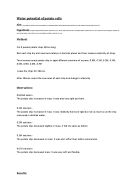Equipment List:
- Electronic balance (Error: ±.01g)
- Table Salt (NaCl)
- Potato
- Corer
- Knife
- Distilled Water
- Graduated Cylinder (±1mL)
- Spoon
- Balance paper
- Ruler (± .1 mm)
- Cups
- 10 Plastic bags
Procedure:
- Core potatoes and cut them into 20 mm lengths. Cut 100 slices and put 10 slices in each plastic bag.
- Set out 10 cup (5 for salt, 5 for water) and label them Cup 1 Distilled Water, Cup 1 Saltwater, etc. Label the bags accordingly.
- Pour 100 mL of distilled water into each cup.
- Weigh out 1.5g over all of salt using balance paper and mix into 5 of the cups labeled “saltwater” using a spoon.
- Using the electronic balance, weigh out each plastic bag with the slices and record their mass.
- Place 10 slices in each cup and let them soak for 21 hours. Blot excess water out.
- After 21 hours, take the potatoes out and place them in the correct bag
- Collect the mass of each bag and record.
- Find the difference, the rate, and use a T-Test to determine significance.
Raw data:
Data Processing:
Overview:
To calculate the rate, find the difference and divide by the number of hours (21). The standard deviation is then calculated by using a TI 89 calculator so that a T-Test can be used to find whether or not the data is significant or not.
Sample Calculation:
Rate: 5-3 = 2/20 = .1
Mean: 1 + 5 + 4 +4 +6 = 20 / 5 = 4
Difference: 5-2=3
Standard Deviation:
4 – 1= 32=9 4-5=-12=1 4-4=0 4-4=0 4-6= -22=4
9+1+0+0+4= 14/5 = 2.8
√2.8/5= .3347
Degrees of Freedom:
5 + 5 = 10 – 2 = 8
Presentation:
Conclusion:
After conducting a T-Test, the probability is 589%. For data to be scientifically significant the probability must be 95% or more, therefore, this data is significant. The potato is taking part in osmosis, this passive transport of molecules from a high concentration to a low concentration across a semi-permeable membrane by water. After this experiment, a conclusion can be made that because the potato is full with starch, salts, and sugars, the concentration is higher than distilled water. It will try to lower the concentration, causing water to flow through it, therefore gaining water mass. When salt was added, the potato had more solutes surrounding it, making the concentration smaller. This made the rate smaller, making the difference in weight smaller. The hypothesis made is incorrect.
Limitations of Experimental Design:
The experiment could’ve been conducted in many different ways, through volume, length, or anything other than mass. The mass of salt and potatoes could’ve been not very precise and the amount of water could’ve been a mL or two off. The salt may have mixed in differently, the time could’ve been off by a few minutes, and the bag weight could be different.
Suggestions for Improvement:
If the investigation had to be redone, a different measure could be used instead of mass, there could be more data in each set, the measurements would’ve been more exact, and the bag weight would be taken off. More salt could be added to see if the weight would actually decrease more.
Reference:
Damon, Alan, McGonegal, Randy, & Ward, William. Biology. Pearson Education Limited, 2007.








